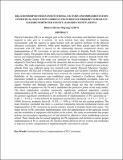| dc.description.abstract | Physical Education (PE) is an integral part of the school curriculum and therefore learners are required to take part in it actively. As such, schools have been identified as learning environments with the capacity to equip learners with the positive attributes of the physical education curriculum. However, while great emphasis have been placed upon the benefits associated with PE, little is known on the relationship between institutional factors and implementation of PE curriculum in private primary schools in Kajiado North Sub-county, Kajiado County. The purpose of this study was to establish this relationship between institutional factors and implementation of PE curriculum in private primary schools in Kajiado North Sub-county, Kajiado County. The study was anchored on Social-ecological Theory. The study adopted Ex Post Facto Design in which the researcher did not have direct control of independent variables. The study population comprised of 100 PE teachers from 25 sampled private primary schools. Data was collected using two research tools namely Physical Education Teachers’ Questionnaire (PETQ) and a Physical Education Equipment and Facilities Checklist (PEEFC). Items from data collection instruments were reviewed for content construct and face validity. Reliability of the instruments was established using Cronbach’s Coefficient Alpha. The instrument yielded an Alpha coefficient of 0.72 which was considered acceptable. Data was analyzed using both descriptive (mean, frequency and percentages) and inferential statistics; Chi-square, Pearson and Multiple regression. The study found out that the coefficient of determination R squared was 58.7% and it established the predictive power of the study model. The three independent variables statistically significantly predicted dependent variable (implementation of PE curriculum) at F (3, 94) = 44.558, p<0.05. Administrative factors made the greatest significant contribution to the prediction of implementation of PE curriculum (β = 0.481, t = 4.716, p < 0.05) followed by equipment and facilities factors (β = 0.311, t = 2.973, p < 0.004). However, academic factor (β = 0.103, t = 1.498, p > 0.05) was not a potent predictor. The study therefore concluded that there is a positive relationship between institutional factors and implementation of PE curriculum in private primary schools in Kajiado North Sub-county. The major drivers of PE curriculum implementation were; the administrators of the particular school and the availability of equipment and facilities in the school. The study recommended that proper policies and procedures regarding size of land should be adhered to when establishing a private school. There should also be annual budgeting for PE equipment and facilities to ensure proper implementation of PE is carried out. PE teachers should attend in-service courses and workshops to improve on their competencies in implementing PE curriculum in schools. | en_US |

